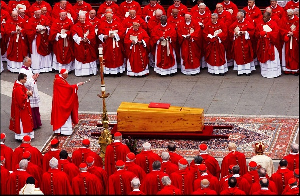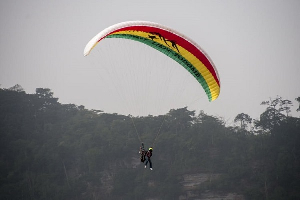This question is really unnecessary and should not be asked. But, sometimes, it becomes necessary to remind us that we are ALL Ghanaians! It will need a little dip into our history – not the short one by W. E. F. Ward we all read as students long ago or anything by Adu Boahen but a more common one found on most Ghanaian websites.
Every school boy and girl in Ghana knows that the nation state that is today called Ghana is a concoction that is the result of the arbitrary (to us) decisions of European powers that were far stronger than us. Modern Ghana is made up of four, somewhat disjointed, units that came together to get independence on March 6th, 1957. Before that day, there was no Ghana. All these four disparate units became Ghana at one and the same time. These four units had been acquired through various treaties, conquests, and plain treachery and theft by the British. Perhaps the first, in the manner in which such things can be said, was the Gold Coast colony proper which consisted of the coastal states with the first official acknowledgement of British control made when the Fante chiefs were tricked into signing a bond with the British in 1844. The coastal states were the first because these blokes came by sea and started bullying the guys they met on the coast. Then they moved into the hinterland and the heartland of the Ashanti Kingdom. The Ashantis fought many brave wars against the invaders but by 1901, the kingdom had come under British control. The British had a much easier time with the north as they smooth-talked their way into convincing the northern chiefs to give up some of their powers to them in exchange for protection – the usual excuse for usurpation.
The history books place the erstwhile Trans-Volta Togoland as the fourth unit that made up our country because this area was never a British colony. This, perhaps, is the reason why some people think the Ewes were the last to join Ghana but the situation is far less clear cut than that. The British and the French, seeing that Germany was going to lose the First World War simply moved in to occupy the German colony that was called Togoland as part of their war against the Germans. They took over – just like that! Without consulting the people who lived there, they divided the area between themselves with the French taking the larger portion and waited for the newly formed League of Nations (where they were dominant), to formally transfer control of the areas to them as trustees. Differences in the colonial policies between the two powers meant that they treated the colonies trusted to them in slightly different ways. Whereas the French were stupidly trying to assimilate these black people into their culture, the British were aware of the fact that they could not hold on to their “possessions” forever and when Gold Coast agitation for independence became stronger they were willing to let go. It was also in their interest to let the territory trusted to them remain under British influence after they had left. The plebiscite of 1956 was manipulated by the British who allowed Nkrumah to campaign in the area when he really had nothing to do there.
But the lie as to whether the Ewes were the last to join up is seen in the status of the coastal areas of the present day Volta Region. These are made up of the Anlos (from which the Ashanti corruption, Awuna, is derived). The area was bought by the British from the Danes on 30th March 1850 in a sale that included all the Danish Gold Coast Settlements which were then incorporated into British Gold Coast. The Anlos were, thus, at no time in history under the Germans and at no time a part of the German territory known as Togoland. Moreover, the area came under formal British control long before the British signed treaties with the Ashanti Kingdom and the chiefs of the Northern territories. Nobody can, therefore, state that the Anlos were never originally part of something that eventually became Ghana or that they were immigrants from Togo! As for the Trans-Volta Togoland, appended to the Gold Coast since around 1916, the area was not made up of only Ewes but stretched beyond Eastern Gonjaland in today’s Northern Region to Pusiga on the Upper Volta border. Even the Ewes of TVT, who had voted not to continue as an integral part of the Gold Coast, gritted their teeth after the bitter disappointment of a defeat they saw as a stolen victory, stayed on in the new nation and contributed their fair share to the national effort as diligently as any other Ghanaian! They didn’t come from anywhere to join anybody but stayed put on their God-given land, powerless against the machinations of more powerful actors.
But all this discussion of who was where first or last should really be made with shame. Nobody should gloat over the fact that his tribe was first or second when our country is the result of colonialism and all its adverse effects that didn’t allow us to find our own path to nationhood. After all, before the white man came, there was widespread interaction among the tribes in the areas, be it through war and conquest, trade, alliances, strategic marriages, or whatever. That is how nations evolve. Why should we celebrate the colonialists’ efforts in making an artificial country that is today called Ghana? We can only accept the blend that is our country as a fait accompli and work hard to make it good for us all.
The Volta Region was created after independence when all the Ewes were brought together in one region. Parts of the erstwhile TVT were removed into today’s Northern Region. The divisions were more sensitive to the tribal groupings in the area than the colonialist creation of our country. But the Volta Region contains much more than the Ewes with many other tribes speaking other languages and an area in and around Kadjebi where the people speak Twi as their first language. For a long time, Ghana was made up of eight regions. The Volta Region was not the ninth region created since the region was one of these eight regions. The derogatory Nr 9 that others call the region is not out of any sense of “lastness” but because the region’s area code is 09 just as some years ago, in certain European countries, you might hit 009 to make an international call. Other accounts say the region got the nickname ”number nine” from the serial number, 9, of the beauty queen, Miss Monica Amekuafia from Alavanyo, who represented the region and won the first ever Miss Ghana competition held sometime in the early 60s.
The present political tension (I view it as political, not individual) between the Ashanti and the Ewe seems to be directed more at the Anlos than the northern Ewe perhaps because Rawlings’ mother is Anlo. Many Ashantis still regard all Ewes as a monolithic unit, which is just as well, since all the Ewes in Ghana regard themselves as one, somehow, more than the various Akan groups do. But, in actual fact, there are more variants of the Ewe language than there are of the Akan language even though there are more Akans than there are Ewes. Yet there is only one written form of Ewe with one alphabet. At the same time, it appears the Ewes are more cognisant of the differences among the Akans than Akans are of the differences among Ewes.
Germany has had a very special relationship with Ghana as it has with Togo. Much of this is due to the sentiments left after their colonial adventures in West Africa. One would think there would be many Ghanaian Ewes in Germany today but there are, in fact, more Ashantis in that country than Ewes. As elsewhere outside Ghana, the typical Ashanti in Germany will start speaking Twi to anybody they meet who says he comes from Ghana irrespective of where in Ghana that person comes from. I have met a few (just a few) Ashantis in Europe who express surprise that a person coming from Ghana cannot speak Twi. This is something that doesn’t quite go down well with many non Twi speakers, even those who speak the language well. But that is only a minor irritation. Often, when I ask my Akan friends why they do not try to speak just a wee bit of my language, they respond dismissively (and at times condescendingly) that my language is too difficult and go on to call Aflao – Aplau and say SogakoPe.
There are too many examples of the adverse effects of tribal strife in modern Africa. The Nigerian civil war saw many deaths and a lot of suffering because one tribe felt threatened in the federation and would no longer want to be part of it. In Rwanda the Tutsis and Hutus speak the same language, live next to each other and attend the same churches yet set on each other with machetes and did not stop until nearly a million lay dead. In Kenya the largest tribe, Kikuyu, would vow that they would never let an uncircumcised Luo rule them and perniciously overturned the true verdict of the people. The resultant conflagration left more than a thousand dead within days. Nearer home in Ivory Coast, a man was prevented from becoming president because he was alleged to have come from a neighbouring country with the whole thing leading to a bloody civil war the likes of which we never want to see in our country. We in Ghana are determined to do everything to prevent such things from happening to us. We have the goodwill to do so. That is why such talk as parents of a certain tribe raising their children to hate people of another tribe, or violence of a certain type common only to a certain tribe but not to others, made without any credible evidence and meant to stoke the embers of tribalism, is a crock of nonsense.
The political parties have the biggest role to play in keeping our country united. We are now enjoying our multi-party democracy which is increasingly becoming the envy of our neighbours. But it will be wrong to think that democracy can solve all our problems. Democracy may be the best form of government available (or the worst form except for all others that have been tried, in Winston Churchill’s formulation) but it is not a perfect system and may not always produce the right results especially in our peculiar circumstances. That is why it may become necessary to tweak it a little bit and nudge it into one direction or the other. We do not have to change the ground rules to achieve this but our parties should be led by men and women who understand certain things. For instance, even though our constitution specifically prohibits parties based on ethnic and regional grounds (Article 55, (4)), it does not prescribe a rotational presidency but it will be up to the parties themselves to ensure that they have such a broad based organisation that the top post in the party cannot effectively be limited to one dominant tribe.
I am often, when it comes to these matters, reminded of Ephraim Amu, a man born in Peki and baptised by a German pastor at a time when the Germans controlled his village and much of present day northern Volta Region. Amu would come of age at the time the British were taking over control of his village and he would walk the 150 miles from Peki Avetile to attend the Training College at Abetifi in the then Gold Coast. He would later teach at the Presbyterian Training College in Akropong where he would master the Twi language so well that he would teach the grammar to the natives! A gifted musician, he composed Yen ara asaase ni originally in Ewe as Denyigba way back in the 1940s to be sung as a counter to the colonial anthem, God Save the King. Amu’s song, as we all know, has become the most beloved tune in our country. It is loved even more than our national anthem whose original text (Lift High the Flag of Ghana) was set to music by yet another E?e – Philip Gbeho. I have always felt that the lyrics of the E?e original of Amu’s tune express a greater nationalist ethos than the more popular Twi translation. Mia denyigba lolo la (This, our beloved homeland), dear reader, is rendered in Twi merely as: Yen ara asaase ni (This is our own land). And whereas the Ewe original, in telling us that our fore-fathers laid down their lives for the land, reminds us it is now our turn to also do all that we can (... miawo miato sinu) for this very land, the Twi translation only requests of us to add something (... yebeye bi atoa so) to the efforts of our forebears. Hush... I shouldn’t be too hard on a translator faced with the difficult task of finding words that fit the tune and at the same time convey the sentiments of the original. And the Twi version does contain some very heavy formulations. No matter in which language you look at it, we are all still reminded of our belonging to the same country with a shared history and a common destiny. And whether this, our beloved homeland (oman no), turns out good or bad that is how it will be for us all (Sigbe ke woano daa...)
Kofi Amenyo (kofi.amenyo@yahoo.com)
Opinions of Wednesday, 11 February 2009
Columnist: Amenyo, Kofi
Who is a Ghanaian, and who is not?
Opinions













